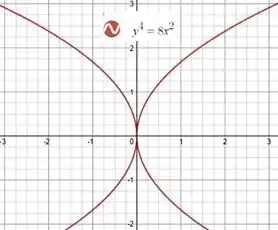The question under debate: Is $y^4=8x^2$ a function or a relation?
We disagree. I say, it's a relation because when I substitute in points
 I get two outputs for most inputs, and thus it's not a function (fails the vertical line test). I also used Wolfram Alpha and Desmos to check the graph, and both of those yield vertical-line-failing horizontal parabolas...
I get two outputs for most inputs, and thus it's not a function (fails the vertical line test). I also used Wolfram Alpha and Desmos to check the graph, and both of those yield vertical-line-failing horizontal parabolas...
 which fail the vertical line test.
which fail the vertical line test.
Another person says "...because the original problem did not include a root... it was an exponent - we quad-rooted the other side to solve for y only... but that wasn't the original question/problem. So the way the original problem is set up, there would be no negative answers... " which means each x has one y, it passes the vertical line test, and it’s a function.
I'll admit, I don't quite understand his reasoning, but there's a lot I don't understand, like how the square root function yields only a positive result but $x^2=9$ yields $+3$ and $-3$, so I can't argue convincingly.
Is there some way to rule either in/out? The answer given by the system indicates my answer is correct, that it's a relation and not a function, but for a host of reasons I won't describe, we don't fully trust that system.
Thank you for any light you can shed that will resolve our debate!